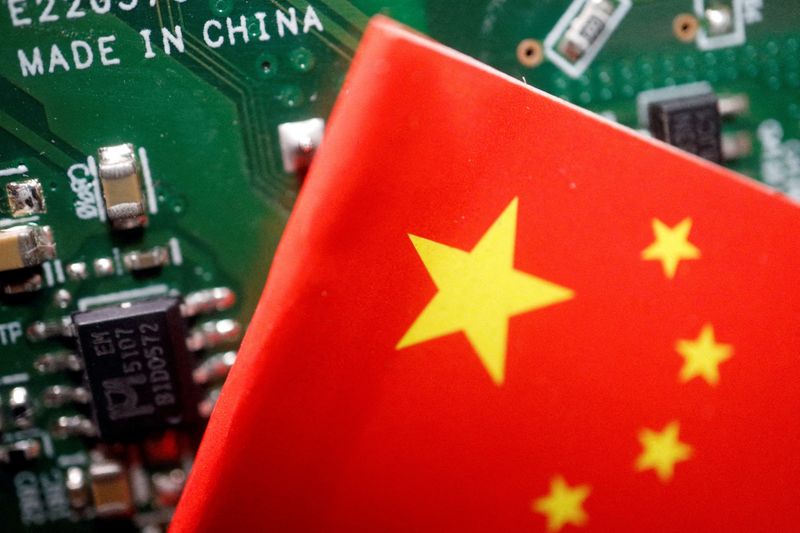By Fanny Potkin and Yelin Mo
SINGAPORE/BEIJING (Reuters) -As the U.S. tightens its restrictions on China's semiconductor industry, Chinese manufacturers of tools used to make chips are benefiting, with orders from the country's foundries accelerating in recent months.
Domestic equipment manufacturers, such as toolmaker Naura and etching equipment maker AMEC, are winning a much higher proportion of tenders from Chinese foundries than in previous years, as chipmakers race to replace foreign-made equipment with domestically made alternatives, research showed.
Nearly half, or 47.25%, of all machinery equipment tenders by Chinese foundries from January to August 2023 were won by local manufacturers, according to an analysis of 182 tenders by Huatai Securities last month.
From July to August 2023, 62% were won by Chinese suppliers compared to only 36.3% from March to April, the brokerage's analysts said.
It marks a turning point for the industry, reflecting acceptance that U.S. restrictions on technology imports are unlikely to ease and could get worse and that self-reliance - as urged by Chinese President Xi Jinping - is the way forward.
The Biden administration on Tuesday expanded measures aimed at China's chip industry that seek to stop Beijing from receiving cutting-edge U.S. technologies to strengthen its military. The measures are expected to be updated annually.
China's foreign ministry said on Wednesday that it has lodged a stern rebuke over the latest chip restrictions, saying that they violated the principles of the market economy and fair competition.
"Before the sanctions, top Chinese foundries would use a small amount of machines from Chinese suppliers, but they would really only experiment with new equipment when they would add new capacity,” one source briefed by the companies told Reuters.
"Now, foundries are testing out Chinese-made equipment for every foreign machine they own and if they find that it meets their needs, they replace all of them," he said. "They want as few foreign machines as feasible."
AMEC and Naura in particular were receiving more orders from China's largest foundries SMIC and Hua Hong Semiconductor, he added.
AMEC, Naura, SMIC, and Hua Hong did not immediately respond to requests for comment.
SALES SOAR
The equipment-related revenue of China’s top 10 domestic equipment manufacturers grew 39% year-on-year for the first half of 2023, representing $2.2 billion in sales, according to a report by CINNO Research.
Chinese companies have been stockpiling foreign-made chip equipment from Japan and the Netherlands, but those avenues are also set to close with those countries expected to join the U.S. in enacting restrictions in coming months.
Analysts said that Chinese manufacturers were getting better at producing equipment in areas such as etching and cleansing, where they compete globally with the likes of U.S. firms Applied Materials Inc (NASDAQ:AMAT) and Lam Research Corp (NASDAQ:LRCX).
Some AMEC machines have entered production lines for chips as advanced as those using 5 nanometer technology, it has disclosed in earnings reports. Its etching equipment is used to remove excess material from the surface of silicon wafers.
One China-based semiconductor analyst, who declined to be named as he was not allowed to speak to the media, said the quality of Chinese-made chip equipment was improving faster than he had anticipated, estimating that they were two years ahead of his original estimates.
"There is definitely huge progress happening in the Chinese semiconductor equipment space, as reflected in the strong revenue growth metrics," he said.
Still some pain points remain, particularly lithography, which requires extremely complex optics and process precision. China has not been able to procure extreme ultraviolet (EUV) lithography machines needed to make the most advanced chips, and the U.S. has now barred even some less advanced deep ultraviolet (DUV) lithography systems from entering China.
The Huatai Securities report revealed that for the first eight months of 2023, only one tender for lithography equipment was awarded to a Chinese company, out of many bids.
China's imports of lithography machines and components used in such machines from the Netherlands rose 81.2% year-over-year to $3.3 billion from January to August, according to Reuters' calculations based on data from China's customs.
The Netherlands' ASML, Europe's largest technology company and a maker of the advanced technology, on Wednesday reported that sales to China represented nearly half of its revenue for the third quarter of 2023.
But the lithography challenge has not stopped Chinese firms from achieving some breakthroughs. Analysts believe that Huawei Technologies and SMIC were able to make an advanced chip for the Mate 60 Pro phone by tweaking DUV machines they were still able to purchase from ASML.

"Local players still lack capability to supply a full set of equipment, such as EUV," said Nori Chiou, investment director at White Oak Capital, saying Chinese manufacturers are focused on covering mature node equipment.
"It’s a long way to go to see advanced semiconductor equipment made in China."
